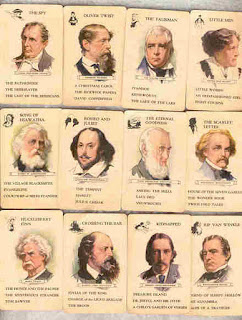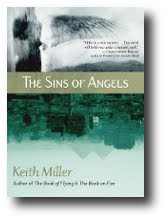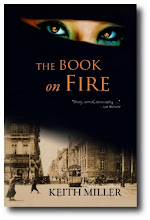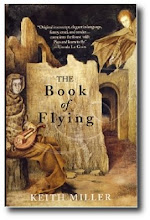The other day we were at a potluck with some fellow Mennonites. We mentioned, for some reason, that we had started playing Authors with our kids. Authors, along with Dutch Blitz, is one of those tribal games that few outsiders seem to have heard of (I'm going to shrug off my congenital Mennonite humility for a moment and state here, for the record, that I kick major ass at Dutch Blitz, and have even, on occasion, toppled the mighty Pete "Fleetfingers" Dula and Steve "Quickhand" Weaver). Ordinary card games were frowned upon by conservative Mennonites. These tame alternatives weren't associated with gambling, drinking, or loose women.
Authors is basically Go Fish. The Authors set we use (it's at least thirty years old) has the following authors: Mark Twain, Nathaniel Hawthorne, Robert Louis Stevenson, Sir Walter Scott, Washington Irving, Shakespeare, Charles Dickens, Henry Wadsworth Longfellow, Alfred, Lord Tennyson, James Fenimore Cooper, and (the lone woman) Louisa May Alcott. When I was a kid, I naturally assumed that these were the giants of Western literature, and placed them on appropriate pedestals. The size of these pedestals I adjusted according to their appearance on the cards. Thus, I assumed that the dashing Hawthorne, with his flowing, strawberry-blond locks, was the pinnacle of literary greatness, while the wan and sickly Scott, with his thin damp hair (we used to call him "Fishface"), I relegated to a minion. Cooper's war-reporter looks and list of manly titles (The Pathfinder, The Deerslayer, The Spy, The Last of the Mohicans) suggested deeply compelling thrillers similar to The Eye of the Needle. Boy, how wrong I was! Cooper, when I finally got around to reading him in high school, turned out to be a dreadful writer. Hawthorne was similarly unreadable. But when, during one stay at my grandparents' Lancaster County, PA house, I ran out of Guideposts and Reader's Digests, I was forced to pick up the only novel on the shelves - Ivanhoe. It was wonderful!
From this distance, of course, Longfellow and Irving look a bit silly in that list. At the potluck, we were trying to decide who should inhabit an updated game. Here's my stab at it: Shakespeare, Jane Austen, Charlotte Bronte, George Eliot, Mark Twain, Herman Melville, Virginia Woolf, James Joyce, Gerard Manley Hopkins, Ernest Hemingway, Yeats. Hmmm. Maybe Faulkner in place of someone . . . Frost? And what about Nabokov? Is he allowed in, even though he was born Russian?
Authors has undergone various metamorphoses. Sets have varied from eleven to fourteen authors, and have included Rudyard Kipling, Joseph Conrad, James Russell Lowell, Victor Hugo, Robert Burns, Ralph Waldo Emerson, and Cornelia Meigs (WTF?). The picture below shows the strange inclusion of John Greenleaf Whittier, second row, second from right:
Here's another version, aimed at children (Hans Christian Andersen, A.A. Milne):
Here's an antique version:
These days, there are a number of Authors games on the market, including American Authors and Women Authors. The quality of the artwork, unfortunately, is shoddy.









I love it! I have been fortunate enough to play Dutch Blitz even though I am of a distinctly NON-Mennonite background. I wonder where I can find an 'Authors' deck of my own.
ReplyDeleteI also love your youthful assumptions of authors based on their pictures on the cards. I, too, found Hawthorne unreadable (or at least not to my taste).
I've been trying to find a good way to send you some fan mail to let you know how much I love your books. I found The Book Of Flying in a box of books that my partner left for me when he joined the Peace Corps; it's the single-most life changing book I've read. I'm so happy you have a blog, but please write more books!
ReplyDeleteThanks so much for leaving a comment, subupperstructure! I'm delighted that you enjoyed The Book of Flying. I'm trying to write more books, but it's a pretty tortuous process. I'll post here when anything comes out . . .
ReplyDeleteI'm surprised a Mennonite would say John Greenleaf Whittier was a "strange inclusion"! He was an abolitionist poet, other topics as well, like snobbery (Maud Muller has the famous lines "of all sad words of tongue or pen, the saddest are 'it might have been'").
ReplyDelete